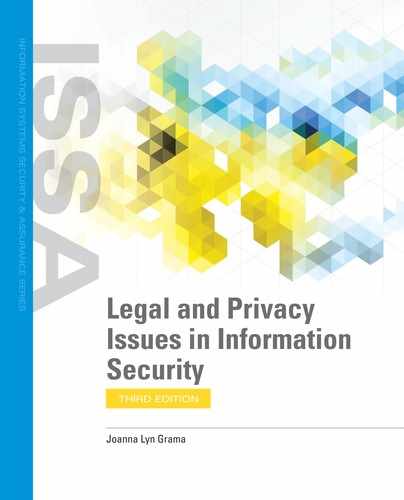Case Studies and Examples
The following case study shows how the concepts discussed in this chapter are used.
Acceptable Use Case Study
Autoliv is a seatbelt and airbag technology company. In 1998, Autoliv’s employee handbook included several policies. It stated employee rules of conduct, including an anti-harassment policy. It also included a computer AUP. Autoliv gave this handbook to all of its employees.
Autoliv’s general rules of conduct stated:
- “Each employee is required to be familiar with these rules and with additional rules which apply to particular jobs and operations. In addition, each employee is expected to maintain conduct consistent with job efficiency and accepted standards of behavior for a business environment. Deviation from those standards may be cause for disciplinary action.”
- “Disciplinary action may be taken for violation of any single rule or combination of rules, or for other improper conduct or unsatisfactory performance, and may include any of the following actions: 1) Employee Discussion; 2) Notice of Caution; 3) Involuntary Suspension; 4) Termination.”
Autoliv’s anti-harassment policy stated that the company did not “tolerate or permit illegal harassment or retaliation of any nature within our workforce.” Its computer AUP prohibited non-business uses of company email. It also prohibited “conduct that reflects unfavorably on the corporation.”15
In 1998, Autoliv investigated employee use of its email system because of system performance issues. It found that email use was causing the performance issues and determined that the bulk of email use was not business related.
In June, Autoliv sent an email to all of its employees reminding them about company policy. It said: “E-mail is to be used for business only. We do not wish to ‘police’ the e-mail system, so your cooperation would be appreciated. Please refrain from sending/receiving these types of messages as it is interfering with legitimate business e-mail.”
Autoliv sent another reminder email to its employees in September 1998. This email warned that an employee could be fired for AUP violations.
In January 1999, Autoliv sent another email to its employees. This email stated that it was a violation of the AUP to share chain letters, jokes and stories, and non-business-related announcements. It also instructed employees to delete those types of emails and not forward them.
A former employee complained to Autoliv that she had received harassing emails from two current employees. Autoliv investigated. It learned that one employee had sent 11 non-business email messages. These messages included jokes, photos, and short videos that were sexually explicit. It found that another employee had sent 25 non-business email messages with similar content. Autoliv immediately fired both employees.
![]() NOTE
NOTE
You can learn about the company at http://www.autoliv.com.
The fired employees filed for unemployment benefits. Autoliv contested this request. A state can deny unemployment benefits if an employee is fired for “just cause,” which means that there is a legally sufficient reason for firing an employee. Autoliv said that it had just cause for firing the two employees.
At the unemployment hearing, the employees admitted that they had received Autoliv’s handbook. They also stated that they knew about the anti-harassment policy. They said they probably had received the three emails about email abuse, but claimed they deleted these emails without reading them. They argued that their firing was not “just” because they did not know they could be fired for sending non-business emails.
The Utah Department of Workforce Services found that Autoliv did not have just cause to fire the employees because the employees said they did not know that they could be fired for their behavior. They were awarded benefits.
Autoliv appealed the agency’s decision to the Workforce Appeals Board. It lost its appeal. Autoliv appealed the decision to the Utah Court of Appeals. Autoliv argued again that the employees had plenty of knowledge that they could be fired for their actions.
Think about the following:
- What do you think the Utah Court of Appeals decided?
- What facts support Autoliv’s argument that the employees had knowledge that their conduct was unacceptable?
- What facts support the employees’ argument that they did not have knowledge that their conduct was unacceptable?
- Do you think sending offensive emails is a “flagrant violation of a universal standard of behavior”?
- Could Autoliv make any changes to its general rules of conduct, anti-harassment policy, or computer AUP that would make employee email responsibilities clear?
The Utah Court of Appeals reversed the decision of the Workforce Appeals Board. It held that Autoliv did have just cause to fire the employees. In its opinion the court stated: “There are two ways to establish that a claimant had knowledge: 1) the employer must have provided a clear explanation of the expected behavior or a written policy regarding the same; or 2) the conduct involved is a flagrant violation of a universal standard of behavior.”16
The court held that the employees’ email activities had violated a universal standard of behavior. It wrote, “We conclude that in today’s workplace, the email transmission of sexually explicit and offensive jokes, pictures, and videos constitutes a flagrant violation of a universal standard of behavior.”17
You can read the court’s opinion at http://caselaw.findlaw.com/ut-court-of-appeals/1369016.html.
